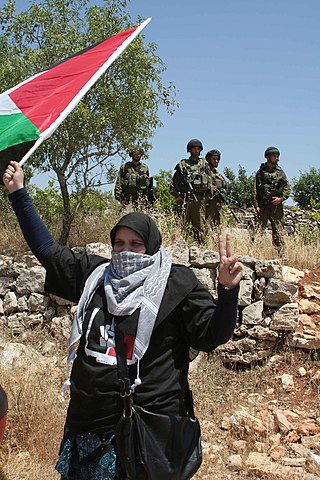See also
- Palestinian exodus (disambiguation)
- Nakba, displacement of Palestinians since the 1948 Palestine war
The Naksa was the displacement of around 300,000 Palestinians from the West Bank and the Gaza Strip in 1967 after the Six-Day War.
Naksa and similar may also mean:

Palestinians are an Arab ethnonational group native to the region of Palestine.
Palestine, offically the State of Palestine, is a country in West Asia

The Six-Day War, also known as the June War, 1967 Arab–Israeli War or Third Arab–Israeli War, was fought between Israel and a coalition of Arab states, primarily Egypt, Syria, and Jordan from 5 to 10 June 1967.
Exodus or the Exodus may refer to:

Ghassan Fayiz Kanafani was a prominent Palestinian author and politician, considered to be a leading novelist of his generation and one of the Arab world's leading Palestinian writers. Kanafani's works have been translated into more than 17 languages.
The Green Line, or 1949 Armistice border, is the demarcation line set out in the 1949 Armistice Agreements between the armies of Israel and those of its neighbors after the 1948 Arab–Israeli War. It served as the de facto borders of the State of Israel from 1949 until the Six-Day War in 1967, and continues to represent Israel's internationally recognized borders with the two Palestinian territories: the West Bank and the Gaza Strip.

Naksa Day is the annual day of commemoration for the Palestinian people of the displacement that accompanied Israel's victory in the Six-Day War on 5 June 1967. As a result of the war, Israel took control of the Palestinian-populated West Bank and Gaza Strip, which were previously annexed by Jordan and controlled by Egypt, respectively.
"Palestinian exodus" may refer to any of the following events:

The Naksa was the displacement of around 280,000 to 325,000 Palestinians from the West Bank and the Gaza Strip, when the territories were captured by Israel in the 1967 Six-Day War. A number of Palestinian villages were destroyed by the Israeli military, such as Imwas, Yalo, Bayt Nuba, Beit Awwa, and Al-Jiftlik, among others.

Palestinian literature refers to the Arabic language novels, short stories and poems produced by Palestinians. Forming part of the broader genre of Arabic literature, contemporary Palestinian literature is often characterized by its heightened sense of irony and the exploration of existential themes and issues of identity. References to the subjects of resistance to occupation, exile, loss, and love and longing for homeland are also common.
ʿArab al-Jahalin also known as al-Jabal is a Palestinian Bedouin neighborhood in the Jerusalem Governorate, located five kilometers southeast of Jerusalem in the West Bank. According to the Palestinian Central Bureau of Statistics (PCBS), ʿArab al-Jahalin had a population of approximately 1,856 inhabitants in mid-year 2017. The village is situated on a hillside outside al-Eizariya and 300 meters away from the Jerusalem Municipal dump. It is located in Area C of the West Bank, with few parts is in Area B. While the Israeli government has full control over the village, the populace hold Palestinian IDs.

Before the Six-Day War and Yom Kippur War, the Golan Heights comprised 312 inhabited areas, including 2 towns, 163 villages, and 108 farms. In 1966, the Syrian population of the Golan Heights was estimated at 147,613. Israel seized about 70% of the Golan Heights in the closing stages of the Six-Day War. Many of these residents fled during the fighting, or were driven out by the Israeli army, and some were evacuated by the Syrian army. The Washington Report on Middle East Affairs in 1992 characterized Israel's actions as "ethnic cleansing".
Rosemary Sayigh is a British-born journalist and scholar of Middle Eastern history. She is known for her works on the Palestinian people, particularly those forcibly displaced to Lebanon as a result of the Nakba.

The 2011 Israeli border demonstrations started on 15 May 2011, to commemorate what the Palestinians observe as Nakba Day. Various groups of people attempted to approach or breach Israel's borders from the Palestinian-controlled territory, Lebanon, Syria, Egypt and Jordan. At least a dozen people were killed when protesters attempted to cross the border from Syria.

Present absentees are Arab internally displaced persons (IDPs) who fled or were expelled from their homes in Mandatory Palestine during the 1947–1949 Palestine war but remained within the area that became the state of Israel.
The Arab–Israeli war normally refers to:
Nakba Day is the day of commemoration for the Nakba, also known as the Palestinian Catastrophe, which comprised the destruction of Palestinian society and homeland in 1948, and the permanent displacement of a majority of the Palestinian people. It is generally commemorated on 15 May, the Gregorian calendar date of the Israeli Declaration of Independence in 1948. For Palestinians, it is an annual day of commemoration of the displacement that preceded and followed Israel's establishment.

I Saw Ramallah is an Arabic language autobiographical book written by Palestinian writer and poet Mourid Barghouti. The English translation of this book was first published in 2000 by the American University in Cairo Press, and later on 16 May 2005 by Bloomsbury. Ahdaf Soueif translated the book to English

"Zahrat al-Mada'en", also marketed under its French title "La Fleur des cités", is a 1967 Arabic song performed by Lebanese singer Fairuz, composed by the Rahbani brothers and written by Said Akl.